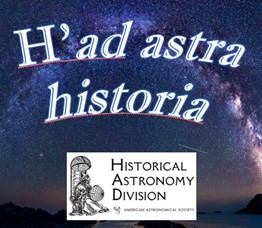Podcaster: Loretta Cannon for the AAS-HAD

Title: H’ad astra historia Ep 205 – Memories of Ed
Organization: Historical Astronomy Division
Link: https://had.aas.org/
Description: Today the Historical Astronomy Division is honoring the late Dr. Edward C Stone who passed away one year ago this month on June 9, 2024. During his 60-year career with JPL-Caltech (that included 10 years as JPL Director) Dr. Stone steered NASA’s Voyager planetary-to-interstellar mission for 50 years as Project Scientist, from concept in 1972 through his retirement in 2022. He “was known for his steady leadership, consensus building, and enthusiasm for engaging the public in science. He left a deep impact on the space community.”
H’ad astra historia is the official podcast for the Historical Astronomy Division of the American Astronomical Society. We’re here to share stories from and about the people who study the stars, planets, and the cosmos. We’ll be hearing from individuals who not only study the history of astronomy, but also those who lived it, who were “in the room” during pivotal events within the last 50 years or so.
podcast music: “Frost Waltz” Kevin MacLeod (incompetech.com), licensed under creative commons: by attribution 4.0 license (http://creativecommons.org/licenses/by/4.0/)
Bio: Loretta Cannon (an AAS affiliate via Rose City Astronomers) is a science-and-word-nerd who really likes the stars. She quite enjoys working as HAD’s podcaster, bringing astronomy stories to you.
Today’s sponsor: Big thanks to our Patreon supporters this month: Paul M. Sutter, Chris Nealen, Frank Frankovic, Frank Tippin, Jako Danar, Michael Freedman, Nik Whitehead, Rani Bush, Ron Diehl, Steven Emert, Brett Duane, Don Swartwout, Vladimir Bogdanov, Steven Kluth, Steve Nerlich, Phyllis Foster, Michael W, James K Wood, Katrina Ince, Cherry Wood.
Please consider sponsoring a day or two. Just click on the “Donate” button on the lower left side of this webpage, or contact us at signup@365daysofastronomy.org.
Please visit our Patreon page: https://www.patreon.com/365DaysOfAstronomy
or you can consider to sponsor a day of our podcast : https://cosmoquest.org/x/365daysofastronomy/product/sponsor-an-episode-of-365-days-of-astronomy/
Transcript:
Rather than provide a verbatim transcript, we’re sharing links for further reading for the topics or names you’ve heard in today’s episode: “Memories of Ed”.
Dr. Edward C. Stone: https://www.jpl.nasa.gov/who-we-are/faces-of-leadership-the-directors-of-jpl/dr-edward-c-stone-1936/
also see https://en.wikipedia.org/wiki/Edward_C._Stone
Shaw Prize in Astronomy Awarded to Ed Stone: https://www.jpl.nasa.gov/news/shaw-prize-in-astronomy-awarded-to-ed-stone/
The ‘Grandfather’ of the Voyager Mission Retires: https://www.sciencefriday.com/segments/voyager-scientist-retires/
JPL’s Obituary for Dr. Stone: https://www.jpl.nasa.gov/news/ed-stone-former-director-of-jpl-and-voyager-project-scientist-dies/
Caltech’s Obituary: https://www.caltech.edu/about/news/edward-stone-1936-2024
It’s in this obituary, in the embedded video, at time-point 2:05, that Ed mentions Linda Morabito’s efforts to identify the ‘anomalous feature’ on the Jovian moon Io; she references this in her story of Ed.
NASA JPL Unveils the Dr. Edward Stone Exploration Trail: https://www.nasa.gov/missions/voyager-program/nasa-jpl-unveils-the-dr-edward-stone-exploration-trail/
Dr. Linda Spilker: https://science.jpl.nasa.gov/people/Spilker/
and listen to her H’ad astra historia podcast interviews: https://cosmoquest.org/x/365daysofastronomy/2024/11/28/nov-28th-where-no-one-has-gone-before/
and https://cosmoquest.org/x/365daysofastronomy/2024/12/26/dec-26th-put-a-ring-on-it/
Dr. Andrew ‘Andy’ Ingersoll: https://www.gps.caltech.edu/people/andrew-p-ingersoll
also see https://en.wikipedia.org/wiki/Andrew_Ingersoll
and this oral history interview: https://digital.archives.caltech.edu/collections/OralHistories/OH_Ingersoll_A/
Dr. William ‘Bill’ Kurth: https://physics.uiowa.edu/people/william-kurth
and https://theconversation.com/profiles/william-kurth-164181
and https://science.nasa.gov/people/bill-kurth/
Dr. Reta Beebe: https://en.wikipedia.org/wiki/Reta_Beebe
and see https://astro.nmsu.edu/research/planetary.html
oral history interview: https://voices.nmfs.noaa.gov/reta-beebe
Dr. Larry Esposito: https://www.planetary.org/profiles/larry-esposito
and see https://lasp.colorado.edu/2025/06/17/planetary-science-professor-larry-esposito-to-step-down/
interview by Todd Barber: https://science.nasa.gov/missions/cassini/insiders-cassini-dr-larry-esposito-and-cassinis-ultraviolet-imaging-spectrograph/
Mister Rogers: https://www.misterrogers.org/watch/
Dr. Robert ‘Bob’ Nelson: https://www.psi.edu/staff/profile/professional-history/robert-nelson/
and https://robertmnelson.medium.com/the-international-ultraviolet-explorer-spacecraft-understanding-the-nature-of-solar-system-objects-f3f20071bc31
Dr. Dennis Matson: https://www.planetary.org/profiles/dennis-matson
and https://www.caltech.edu/campus-life-events/calendar/icassini-huygens-at-saturni-dennis-matson
Dr. Arther ‘Lonne’ Lane: https://science.nasa.gov/people/lonne-lane/
Dr. Linda Morabito: https://www.lindamorabito.com/about.html
Dr. Garry Hunt, OBE: https://www.theregister.com/2018/09/18/garry_hunt_interview/
and https://expertfile.com/experts/garry.hunt/garry-hunt
Dr. Alan Cummings: https://science.nasa.gov/people/alan-cummings/
and https://www.pma.caltech.edu/news/voyager-scientist-celebrates-50-years-at-caltech
Caltech Interview: https://heritageproject.caltech.edu/interviews-updates/alan-cummings
Dr. Rochus ‘Robbie’ Vogt: https://en.wikipedia.org/wiki/Rochus_Eugen_Vogt
and see https://giving.caltech.edu/news/new-fellowship-honors-robbie-vogt-who-shaped-world-leading-observatories
Larry Dumas: https://www.latimes.com/archives/la-xpm-1992-06-11-me-482-story.html
and see https://www.jpl.nasa.gov/news/larry-n-dumas-named-assistant-laboratory-director-of-telecommunications-and-data-acquisition-office/
and https://www.jpl.nasa.gov/news/certificate-awarded-to-nasas-deep-space-network/
Dr. Jamie S Rankin: https://spacephysics.princeton.edu/people/jamie-s-rankin-phd
Dr. Todd J Barber: https://science.nasa.gov/people/todd-j-barber/
and see https://www.jpl.nasa.gov/edu/news/a-chat-with-todd-barber-propulsion-engineer-meets-bear-grylls/
Yosemite National Park: https://www.nps.gov/yose/index.htm
Lassen Volcanic National Park: https://www.nps.gov/lavo/index.htm
Lake Tahoe Things to Do: https://tahoe.com/things-to-do/zipline
Documentary film – The Farthest Voyager (2017)
trailer: https://www.youtube.com/watch?v=9fyI-8FmV4I
full documentary: https://www.pbs.org/the-farthest/
It’s also available for viewing via PBS Passport, a streaming service free with your annual PBS donation.
Voyager Mission Status: https://science.nasa.gov/mission/voyager/where-are-voyager-1-and-voyager-2-now/ This page has a table with elapsed mission time (in real time) and the distance each spacecraft has traveled (distance from Earth and the Sun). During the Spring (around March-ish), the distance from Earth decreases for a bit before increasing again; this is a normal phenomenon due to the Earth orbiting the Sun annually. Farther down on the webpage is a Table listing all instruments on the two spacecraft, including dates when an instrument was turned off or stopped working.
NASA’s Voyager HOME page: https://science.nasa.gov/mission/voyager
Voyager Mission Overview: https://science.nasa.gov/mission/voyager/mission-overview/
Voyager as seen in NASA’s Eyes on the Solar System:
https://eyes.nasa.gov/apps/solar-system/#/sc_voyager_1
This page is a real treat! You can ‘see’ the spacecraft’s location in real time, or you can move it backwards to watch its travels since 1977, and so much more.
Voyager: Grand Tour (an archived NASA documentary from 1990 that “takes us through the Voyager mission from launch and gives a description of what was found at each planet starting at Jupiter [and] going through Saturn, Uranus, Neptune and into future missions.”)
https://archive.org/details/voyager_grand_tour
podcast music: “Frost Waltz” Kevin MacLeod (incompetech.com), licensed under creative commons: by attribution 4.0 license (http://creativecommons.org/licenses/by/4.0/)
End of podcast:
365 Days of Astronomy
=====================
The 365 Days of Astronomy Podcast is produced by Planetary Science Institute. Audio post production by me, Richard Drumm, project management by Avivah Yamani, and hosting donated by libsyn.com. This content is released under a creative commons Attribution-NonCommercial 4.0 International license. Please share what you love but don’t sell what’s free.
This show is made possible thanks to the generous donations of people like you! Please consider supporting our show on Patreon.com/CosmoQuestX and get access to bonus content. Without your passion and contribution, we won’t be able to share the stories and inspire the worlds. We invite you to join our community of storytellers and share your voice with listeners worldwide.
As we wrap up today’s episode, we are looking forward to unravel more stories from the Universe. With every new discovery from ground-based and space-based observatories, and each milestone in space exploration, we come closer to understanding the cosmos and our place within it.
Until next time let the stars guide your curiosity

